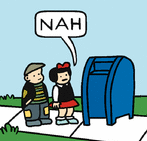|
Bertrand Hustle posted:How did we get Copenhagen from that? How does havn turn into hagen? No idea  Here's a whole list of various historical spellings (fold it out by clicking the pluses): http://digdag.dk.linux28.unoeuro-server.com/service/digdag.php?Hvad=Enhed&di=193533
|
|
|
|

|
| # ? May 19, 2024 21:08 |
|
Wheat Loaf posted:I have a bit of a fascination with Adrian Carton de Wiart, because he comes off like Lance-Corporal Jones from Dad's Army if he was real and had been a lieutenant-general. "Quite frankly, I enjoyed the war."
|
|
|
|
Shbobdb posted:That seems more like handwritten Fraktur and local spelling idiopathies. Do you have any examples and where were they from? German got standardized as a language super late. Well, I'm not saying that it was the official spelling, because there was no such thing in German until 1903  The examples I'm familiar with come from early 17th century Austrian documents, like a 1626 report on the state of repair of a church in Vienna where it says: "[d]er vnkhosten betrefent, vermelden sie werkleuth, weilln nach Abtragungen der Zermoderten gemewer, wenig von Mauerwerkh wurde stehen bleiben, dass die Abtragung vnndt widererbawung schier halb so vil, Alss wan man an den orth von den Alten mit hülff nemmen Materialien, ein Neur bawe wolte Khosten wurde" The examples I'm familiar with come from early 17th century Austrian documents, like a 1626 report on the state of repair of a church in Vienna where it says: "[d]er vnkhosten betrefent, vermelden sie werkleuth, weilln nach Abtragungen der Zermoderten gemewer, wenig von Mauerwerkh wurde stehen bleiben, dass die Abtragung vnndt widererbawung schier halb so vil, Alss wan man an den orth von den Alten mit hülff nemmen Materialien, ein Neur bawe wolte Khosten wurde"I've bolded the parts where the scribe writes "v" or "w" instead of "u". I didn't transcribe it personally though, mind you, but rely instead on the transcription done by a Viennese scholar in 1872. The stuff I personally work with is for the most part post-1670, and there they write "und" (sometimes also "undt" or "unndt") instead.
|
|
|
|
System Metternich posted:The stuff I personally work with is for the most part post-1670, and there they write "und" (sometimes also "undt" or "unndt") instead.
|
|
|
|
Can I ask for a recommendation of Boer Wars and related books or a documentary type thing to watch before or after the book. I have been interested in South Africa's history but there's a ton of stuff about after WW2 to current, not so much before. Boer war in particular being specific about 1 side or small part. This is another thing that is just mostly unknown to people in the US, who are not interested in history I mean, so most people. I know there wasn't a mention in any school I went to of anything turn of the century Africa. What kills me is I've seen short 5 minute videos mentioning the camps, the deaths, the leaders/royalty responsible, but always just "the boers" being the enemy of britain. I just looked up how and why irish were fighting with them to find out that the Boers were Dutch and German people that moved there as farmers and such. They just were unlucky (lucky) in the sense that the land they chose had all these gold mines, and they were not exploiting them to their potential, so naturally britain ends up in an unrelated war, taking the land and ends up with the mines. I have always read/heard it described very generally as The colonizing british against guerilla fighters, tribes of fighters, or just tribes. Being ignorant to all this, I assume britain is fighting against african tribes united as boers, who would use guerilla fighting opposed to large scale combat they were not used to. I would shed a tear for this if it would do anything, so instead I just need to know to get rid of the BS in my head. Of course 200 Irish were helping them, I now understand, but before I read a little from wikipedia it was very odd. I just learned Scorched Earth Policy isn't from the world wars or a worst case cold war idea, but the british policy here in 1899 of scorching the earth and anything on it. That's quite dedicated, wouldn't they be hand setting fires mostly? Torches, etc? I guess salting the earth is similar and older, is there any connection besides the earth and destruction? Is the whole white minority rule in apartheid really ironic, having killed tons of people who would have been there, as part of "white" rule, later? That might be reaching. I'm sure i'll read the wikipedia stuff but that's just not detailed enough or gives a sense of small scale within large if that makes sense. Infyrno has a new favorite as of 12:59 on Dec 1, 2016 |
|
|
|
Infyrno posted:Can I ask for a recommendation of Boer Wars and related books or a documentary type thing to watch before or after the book. I have been interested in South Africa's history but there's a ton of stuff about after WW2 to current, not so much before. Boer war in particular being specific about 1 side or small part. This is another thing that is just mostly unknown to people in the US, who are not interested in history I mean, so most people. I know there wasn't a mention in any school I went to of anything turn of the century Africa. This has been posted previously in this thread I think, but I seriously think it's worth a repost. The American Hippopotamus, from the Atavist Magazine Does contain a tiny mention of the Boer War, but I think you'll appreciate this regardless.
|
|
|
|
I have a vague memory from school that the British scorched earth with lime although it may have been a different chemical.
|
|
|
|
Infyrno posted:Can I ask for a recommendation of Boer Wars and related books or a documentary type thing to watch before or after the book. I have been interested in South Africa's history but there's a ton of stuff about after WW2 to current, not so much before. Boer war in particular being specific about 1 side or small part. This is another thing that is just mostly unknown to people in the US, who are not interested in history I mean, so most people. I know there wasn't a mention in any school I went to of anything turn of the century Africa. My man, I don't think the Boer War is the story you are after. I think you may be more interested in this: https://www.amazon.com/King-Leopolds-Ghost-Heroism-Colonial/dp/0618001905/
|
|
|
|
Scorched earth goes all the way back to the end of the Punic Wars, when the Romans sowed the fields in Carthage with salt after they defeated them. Of course, if you go back to the Old Testament, I reckon there must be more than one account of God instructing the children of Israel (as they travelled through the Promised Land) to destroy the cities of their enemies so thoroughly that there would be no too bricks on top of one another when they were through. The concept, at least, is very old indeed.
|
|
|
|
Wheat Loaf posted:Scorched earth goes all the way back to the end of the Punic Wars, when the Romans sowed the fields in Carthage with salt after they defeated them. I've always wondered about that part, was it literally salted? Salt was a valuable and precious commodity that was resource-intensive to get for pretty much all of history. It wouldn't be un-Roman to blow a good bit of the treasury on a gesture of spite, but still...
|
|
|
|
hogmartin posted:I've always wondered about that part, was it literally salted? Salt was a valuable and precious commodity that was resource-intensive to get for pretty much all of history. It wouldn't be un-Roman to blow a good bit of the treasury on a gesture of spite, but still... I always thought it was probably figurative more than literal. They used to pay soldiers in salt, I believe, and that's where the phrase "worth your salt" comes from.
|
|
|
|
hogmartin posted:I've always wondered about that part, was it literally salted? Salt was a valuable and precious commodity that was resource-intensive to get for pretty much all of history. It wouldn't be un-Roman to blow a good bit of the treasury on a gesture of spite, but still... If they didn't actually use salt and it was just a turn of phrase I'd imagine realistically this type of treatment would be one of those "murder or enslave every male over 5 years old" type of things where they destroy a people's ability to sustain themselves off the land by taking away half the population.
|
|
|
|
Wheat Loaf posted:I always thought it was probably figurative more than literal. That's where the word 'salary' comes from as well - or at least the allowance that Roman soldiers were given to buy salt, depending on which source you go by.
|
|
|
|
Rome salting Carthage is apparently a 19th century invention, but there's plenty of legends about salted earth. Presumably the idea came from somewhere... http://www.straightdope.com/columns/read/2698/did-ancient-conquerors-punish-their-enemies-by-sowing-captured-fields-with-salt https://en.wikipedia.org/wiki/Salting_the_earth
|
|
|
|
Diamonds, Gold, & War is a great book on the Boer wars.
|
|
|
|
I think I noted previously in this thread that the term "Little Englander" - which today has pronounced xenophobic and even racist connotations - originated as a description of Liberal politicians who opposed the Boer Wars and imperialism in general. Quite ironic when you consider the stereotypical character of people who tend to be described as Little Englanders today.
|
|
|
hogmartin posted:I've always wondered about that part, was it literally salted? Salt was a valuable and precious commodity that was resource-intensive to get for pretty much all of history. It wouldn't be un-Roman to blow a good bit of the treasury on a gesture of spite, but still... There was no boundaries to Roman spite. They launched a full scale invasion of Germany in 14 AD for example just to retrieve to eagle standards that Arminius had captured in 9 AD.
|
|
|
|
|
RedneckwithGuns posted:If they didn't actually use salt and it was just a turn of phrase I'd imagine realistically this type of treatment would be one of those "murder or enslave every male over 5 years old" type of things where they destroy a people's ability to sustain themselves off the land by taking away half the population. Oh, they did more than that. After the last Punic war, the Romans completely burn the city to the ground and enslaved everyone who had survived the siege. They were really out to end Carthage for good. But it's worth remembering that Carthage was only one of several Phoenician cities in North Africa, even if it dominated the others. The Romans didn't have the same kind of hatred for the other cities as long as they submitted.
|
|
|
|
Alhazred posted:There was no boundaries to Roman spite. They launched a full scale invasion of Germany in 14 AD for example just to retrieve to eagle standards that Arminius had captured in 9 AD. They didn't want the eagles just out of spite, but to restore some pride in their military power after a crushing defeat. The eagle was the standard of the legion and represented its martial reputation, and every time the Romans lost one they made a gigantic deal out of it because it was basically a constant reminder that one of their armies got punked. One of Augustus Caesar's most lauded accomplishments was his diplomatic retrieval of the eagles of Crassus from Persia, 33 years after Crassus lost them when his army was massacred at Carrhae. The Arminius situation was quite a bit worse than that because, while Crassus had hosed up big time and gotten captured and killed together with a large part of his army, at least some thousands escaped and made it back to Roman Syria (under the command of Cassius, who later conspired to kill Julius Caesar). Nor did the Persians successfully press their advantage, but were content with a decisive victory, and the propaganda value of a victory, over a Roman army. In the case of Arminius, the three legions under Quintilius Varus got completely wiped out, followed by almost every Roman force, encampment, or town east of the Rhine. One garrison managed to escape in good order, of all the Roman presence in Germany, across the Rhine. Those three legions made up probably about 10% of the entire force of the Roman army at that time. To put that in perspective a bit, that's like if over 120,000 American military personnel were killed in a single battle by an enemy they didn't even respect, but thought of as barbarians, little better than animals. And to cap it off, the enemy then stole the American flag and paraded it around while calling Americans a bunch of pussies and telling everyone about how the American general was a total wimp who killed himself when he saw the battle was lost, and mailed his severed head to the barbarian king next country over asking if he wanted to team up. (In the event, King Maroboduus wasn't interested in teaming up with Arminius, and they actually wound up at war with each other a couple years later). Point being it was a gigantic disaster and virtually any modern country in the world would have needed to respond with war or be known as the weakest losers that ever lived -- let alone an ancient state like Rome that didn't have any clear delineation between civilian and military power, where the ruler of the state was a warlord who commanded the personal loyalties of the soldiery not by law but because he paid them. Augustus Caesar, when he heard of the massacre, allegedly banged his head on the walls of his house, shouting, "Quintilius Varus, give me back my legions!" Which may or may not be true but makes the point that the Romans felt it was a massive loss of soldiery and prestige that absolutely needed to be avenged. e: mind you this also skips over the political importance on the Roman side. When the campaign against the Germans was launched in 14, Augustus Caesar had just died and Tiberius had succeeded to his powers. However, Tiberius wouldn't honor the bonuses that Augustus had promised to pay the army on the German frontier, and when he sent his adopted son Germanicus to lead the army they threatened to mutiny. Not having the money to pay them off himself, he led them to go plunder the poo poo out of the Germans so they wouldn't revolt. skasion has a new favorite as of 19:40 on Dec 1, 2016 |
|
|
|
hogmartin posted:I've always wondered about that part, was it literally salted? Salt was a valuable and precious commodity that was resource-intensive to get for pretty much all of history. It wouldn't be un-Roman to blow a good bit of the treasury on a gesture of spite, but still... They did not salt the earth of Carthage. They burned the city to the ground, and enslaved everyone that lived there. We know for a fact that the ground was not salted, because the Romans colonized the ruins and sent their own people to live there. They wouldn't ruin a perfectly nice spot to live out of spit for a people that are 100% dead/enslaved.
|
|
|
|
"Salted land" was a real phenomenon, just not generally a deliberate one. Heavy irrigation would often lead to a build-up of salt in the land, making it unarable. The only solution was to deliberately flood the entire area or just leave the land fallow for a couple decades while the salt washed out. Hence the idea of salting someone's lands was more of a euphemism for leaving the area devastated so nothing would grow and no one could live there. It probably did not involve actually throwing salt on it, though.
|
|
|
|
If only the Romans had had the power of the atom.
|
|
|
Weembles posted:That's where the word 'salary' comes from as well - or at least the allowance that Roman soldiers were given to buy salt, depending on which source you go by. Roman salt stockpiles were decimated by the salting of Carthage.
|
|
|
|
|
Decrepus posted:Roman salt stockpiles were decimated by the salting of Carthage.
|
|
|
|
Platystemon posted:If only the Romans had had the power of the atom. If only people had listened to Democritus, instead of that doofus Plato.
|
|
|
|
Rutibex posted:If only people had listened to Democritus, instead of that doofus Plato. Democritus gets too much credit. He believed in atomism because he thought it elegant, not out of any empirical evidence for it. It was just a tidy little idea of his, no different than Plato’s wrong ideas, except that millennia later, we discovered that, in a complete coincidence, it has an uncanny resemblance to reality. If he’d done the teaspoon of oil experiment, that I would respect.
|
|
|
|
The Second Secretary-General of the United Nations was a Swede whose name roughly translates in English to Doug Hammershield. He's also the only one to die and office and the only person to receive a Noble Peace Prize posthumously.
|
|
|
|
*Day Hammershield One of many UN secretaries with awesome names
|
|
|
|
Powaqoatse posted:*Day Hammershield He also managed to piss of pretty much everyone during his tenure as Secretary general. Navigating cold war politics was difficult. Boutros Boutros Ghali had the best name.
|
|
|
|
nagel posted:He also managed to piss of pretty much everyone during his tenure as Secretary general. Navigating cold war politics was difficult. Yeah, it seems like they figured they'd get another generic Scandinavian to replace the first guy and then whoops turns out he takes 'standing up for the little guy' seriously.
|
|
|
|
Oh the British got outstanding military names locked down. The army in particular has a seemingly endless supply of silly names, such as Generals: Sir Arthur Augustus Thurlow Cunynghame, Michael Anthony Shrapnel Biddulph and Harry North Dalrymple Prendergast for more see: https://en.wikipedia.org/wiki/List_of_British_Army_full_generals
|
|
|
|
That first one was probably called "Biddy" by his mates.
|
|
|
|
Tasteful Dickpic posted:That first one was probably called "Biddy" by his mates. Oh they'd all have names like "chuffy" or "spanker" to their friends.
|
|
|
|
*in extremely King George VI voice* andum hereby, granting eh um Wa-*turns away, confers with Bishop of Canterbury*-Ahemmmhem. Kneel, Filihew Marginald Corbweather III, Baronet of Homesley! I hereby proclaim thee Knight of Wankers *blushes, leaves stage quickly*
|
|
|
|
I actually have a question, I see a lot of "heroes" from the past were considered poets or at least wrote poems. I am assuming poetry wasn't always considered feminine or wimpy. When and why did that change to the current stereotypes about poetry? Does anyone know?
|
|
|
|
RenegadeStyle1 posted:I actually have a question, I see a lot of "heroes" from the past were considered poets or at least wrote poems. I am assuming poetry wasn't always considered feminine or wimpy. When and why did that change to the current stereotypes about poetry? Does anyone know? I don't think its a stereotype about poetry in particular, but intellectuals. Writing poems is something city clicker nerds do, not like us simple country folk who just need to bring in the harvest.
|
|
|
|
(In a very Catulline voice): Wimpy, you say? I will sodomize and face-gently caress you.
|
|
|
|
nagel posted:He also managed to piss of pretty much everyone during his tenure as Secretary general. Navigating cold war politics was difficult. I like U Thant. I'm pretty sure MC Hammer wrote a song in his honor.
|
|
|
|
Rutibex posted:I don't think its a stereotype about poetry in particular, but intellectuals. Writing poems is something city clicker nerds do, not like us simple country folk who just need to bring in the harvest. yeah sorta even from when the "modern era" started, a classical education was the bare minimum that you (you, the historical 1%er) would provide for your kid so the natural endgame is that cool dudes read or write poems out loud
|
|
|
|

|
| # ? May 19, 2024 21:08 |
|
Wheat Loaf posted:Scorched earth goes all the way back to the end of the Punic Wars, when the Romans sowed the fields in Carthage with salt after they defeated them. Pharaoh Horemheb, who took the throne a few years after Tutankhamun's death, ordered the destruction of all temples dedicated to the Aten, the sole god whose prominence was created by Tutankhamen's father, Pharaoh Akhenaten. He also ordered the destruction of Akhetaten, Akhenaten's new capitol city. Blocks from the Aten temple at Thebes were used to stuff the interior of walls for other temples. Recycling cut stone was the norm. Some of these resurfaced during excavations in the 1960s. The blocks, called talatat because of their size, were photographed and entered into a database. To this day they have been recreating, photographically, the temple they once decorated. The city was not so lucky, or rather none of the recycled stone has been found. It was mostly of mud brick, though, so once the protective roof was gone the buildings would be vulnerable. Still, it's clear from excavations and ongoing work that the city, now known as Amarna, was pretty thoroughly destroyed. As this was ca 1320 BC, it's clear the idea of leveling a city is, yes, very old indeed.
|
|
|







































